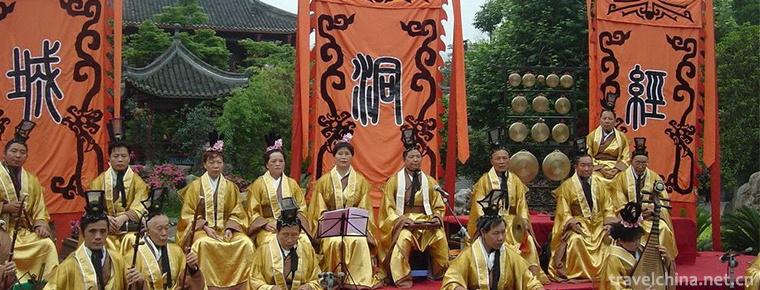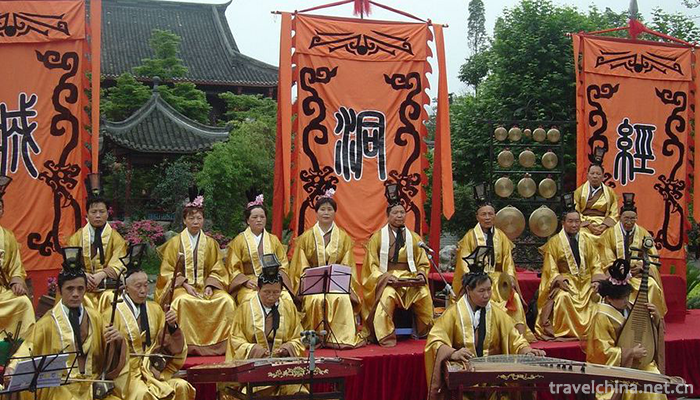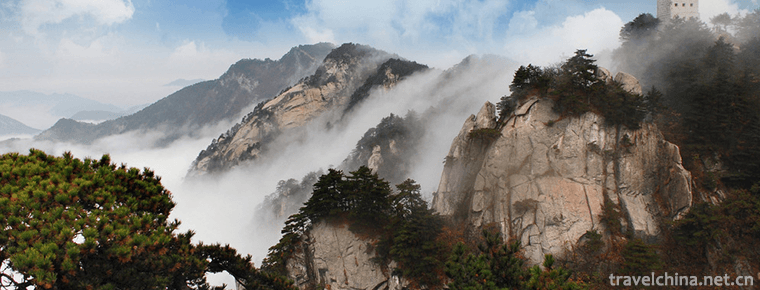2018-12-08

- By ChinaWiki.net
- Chinese Edition
- 2019-04-28
dongjing music
Dongjing music is a very ancient traditional instrumental music, which originated in Sichuan Province in the Song Dynasty and is now popular in Sichuan Province. Yunnan Han nationality area, Lijiang, Chuxiong and other Naxi and Yi nationality areas, originated from ancient Taoist silk and bamboo music in the Central Plains.
Dongjing music originated in Pengxi County, Sichuan Province, and its founders were Liu Ansheng and Wei Qi.
On November 11, 2014, Dongjing Music was approved by the State Council and listed in the fourth batch of national intangible cultural heritage list.
historical origin
With a long history, the instruments used in Yunnan are penny-wise, martial arts, large bands and beautiful, simple and elegant music style. It is named after the Taoist Scripture Wenchang Dadong Immortal Sutra. Taoist scriptures are divided into three holes, namely, Dongzhen, Dongxuan and Dongshen, which are preached by Taoist gods of the three Qing dynasties. Therefore, Taoist scriptures are called Dongjing, playing music praised by poems in chanting scriptures, so they are called Dongjing music.
Dongjing music originated in Pengxi County, Sichuan Province. Its founders are Liu Ansheng and Wei Qi.
Liu Ansheng, a native of Pengxi County, Sichuan Province, in the Southern Song Dynasty, wrote five volumes of Wenchang Dadongxian Jing in Yuxutan, Baoping Mountain, Pengxi County (now Chicheng Mountain), four years after Qiandao (1168). It was widely circulated in the society. As a result of the performance of Wenchang Dadongxian Jing, a well-known music of Dongjing was formed. Liu Ansheng was the pioneer of Dongjing music.
Wei Qi, Yuan Ren, No. Zhongyangzi, is a hermit in Penglai Mountain, Pengxi County, Sichuan Province. Youhao Daoshu is a good Taoist art, and has been a military and civilian officer of Nanping Qijiang District. At the beginning of Yuan Dynasty, Wei Qi annotated Liu Ansheng's Wenchang Dadong Xianjing in Penglai Mountain, Pengxi County, Dongshu Province. From Yuan Dynasty to 1310, Wei Qi dedicated his Annotation of Wenchang Dadong Xianjing to Yuan Wuzong, which was rewarded and famous throughout the country. Wei Qi contributed a lot to the production and dissemination of Dong Jing music in Yunnan and Sichuan provinces. In Ming Dynasty, governor of Henan Province and Yiren Yang Zuohe wrote in The Record of Building Shiyushan Academy: "Zhongyangzi of Penglai Mountain once commented on Dadong Xianjing." This is the earliest record of Wei Qi's annotation of "Dadong Xianjing" in Penglai Mountain, Pengxi County, Sichuan Province. Dongjing music is the living fossil of music and has been recognized by UNESCO as the precious intangible cultural heritage of mankind.
"Huaping County Literature and History Material". Series 2 says: Dongjing music was introduced from Sichuan to Dali in the 7th year of Yongle Ming Dynasty (1409). Nanjian County Literature and History Material, Series 1 also says that the Ming Yongle was introduced from Sichuan to Dali in the 7th year, and then from Dali to Yunnan. Tonghai County Material is also said to be introduced from Sichuan. The Preface of Dali Dongjing Music says: Dali and Xia in the 13th year of Jiajing Ming Dynasty (1534). Guan Zeng sent people to Sichuan to rehearse the Dadong Immortal Sutra and brought back two pieces of it. Although there was a gap in the time of the four statements, they were definitely introduced from Sichuan. These statements are relatively reliable. They can be referred to by the Tongzhi of Yunnan compiled by Li Yuanyang, a Ming Dynasty scholar. It records the situation of Wenchang Palace in various prefectures and counties of Yunnan in the early Ming Dynasty. Wenchang Palace is the headquarters of the activities of the Dongjing Festival, and the music of the Dongjing is convenient. The book contains: Kunming Wenchang Palace is outside Ximen, Chuxiong Zitong Temple is outside Renfumen, Wuding Wenchang Temple is inside the old palace, Heqing Wenchang Temple is inside Taixuan Palace, Yongsheng Zitong Temple is in the south of the palace, Yongsheng Zitong Temple is in the south of the prefecture, Baoshan Wenchang Temple is at the foot of Taihe Mountain, Hongzhi Deputy Ambassador Lin Junjian is in the middle of the city. It can be seen that Wenchang Palace was prevalent long before Jiajing. Yao'an County Chronicle, Volume 55, compiled by Yunlong, a scholar of the Republic of China, contains all the counties of the Yunnan Economic Society. Yao Yi established a society in the Ming Dynasty to worship Wenchang, sing and satirizing holy scriptures, and imperial sutras, in order to pray for peace. At the beginning of the Qing Dynasty, there were Geng Yu prayers, traveling in Jiangsu and Zhejiang, practicing music and conducting a lot of music. At the beginning of the Qing Dynasty, Ma Juliang returned from Eastern Zhejiang Province, and corrected the music by the Guanglu Society. He was also imitated by Yao An. The musical instruments are Zheng, Pa, Guan, Zhong, Gu, Zang and Cymbal. The funds and articles are kept by different societies, and they are rotated every year. The first one who joins the society says that he is a senior, while the fashionable one says that he is a senior. When he joins the society, he feels that he is young and orderly, ritual and Tao Yueshu, and the weather is Xiaoyan. Yang Liqian's Zhaotong County Zhi Manuscript (Volume 6) contains: Dongjing Tan, which is handed down from the provincial plain. All the people who pray for sunshine, pray for rain, Christmas, celebration and excessive activities know their sutras, mixed with Buddhism and Taoism, and attended the altar are men, but not women. These records show that the Dongjing music in Yunnan has begun to flourish in the Ming Dynasty, and other statements are only variants introduced from Sichuan.
The Qing Dynasty witnessed the prosperity of Dongjing Music in Yunnan Province during its popularization, development, prosperity and amalgamation. More than 120 counties and towns with large population in Yunnan Province had regular activities of Dongjing bands in varying numbers. Moreover, the activities were well organized, standardized, institutionalized and regularized, and gradually spread to Myanmar and Vietnam along with the horse bands. In the late Ming and early Qing Dynasties, due to social unrest, Yunnan Province had regular activities. People from West Chuxiong, Dali, Baoshan and Tengchong moved to Myitkyina and Mandalay, Myanmar, to do business. Mengzi, Gejiu, Shiping and Jianshui people from southern Yunnan fled to Vietnam, where music flowed into foreign gangs and blossomed among the Chinese. Dian people left their homeland to cherish their relatives, and on the occasion of the festival, they began to write Confucian classics and play musical instruments. The pleasant local music had made many Chinese nostalgic. Tears of my homeland...
During the period of the Republic of China, Dongjing music was still playing in Yunnan according to the rules. Even before Tang Jiyao left the school to fight against Yuan Shikai, he asked the provincial city to talk about the sacrificial banner of Dongjing. On the eve of liberation, there were still 89 Dongjing bands in Kunming. Yunnan was liberated, and a group of old Dongjing people headed by Peng Youshan set up the "Research Association of Ancient Music" to collect and arrange music scores.
Inheritance significance
Singing Dongjing music is an important carrier of Dongjing culture inheritance. The Pengxi Dongjing Music Research Association has been established for more than three years. It has focused on the excavation of historical materials and the construction of music teams. There are 98 people in the county town, including "Dongjing Ancient Music Orchestra" and "Dongjing Ancient Music Concert Team". There are 32 people in the Ming and Menstrual Branches, totaling more than 130 people in the Jing Band. According to the records of the inheritance of Confucianism and Taoism in the Ming and Yu In sacrificing Lao Tzu, Wenchang, Guansheng, Confucius, Huanhou and Sakya's birthdays, in addition to chanting the Scriptures such as Tao Te Jing, Yin Jiwen, Jue Shi, Xiao Jing and other related scriptures, we must add 1-3 chapters of Da Dong Xian Jing, that is, taking Da Dong Xian Jing as the Tong Jing. Singing Wenchang Xiangzan, Yang Zhizan, Bagua Zan, Sui Sheng Ling, Xiao Kaimen and Nan Qing Gong. Music has never faded for a century. Today's construction of spiritual civilization keeps pace with the times. We should transfer Dongjing music to the stage of art, mount the hall of elegance, and play classical Suites such as Ruixiang Baojiao, Dongxian Song, Jintangyue and Cosmetology Platform, which are magnificent, relaxing and melodious, and attractive. We can inherit the combination of tradition and reality, make it glorious, step out of the county gate and across the country. To the world, the day is just around the corner.

Ask a Question
Your email address will not be published.


0 Questions